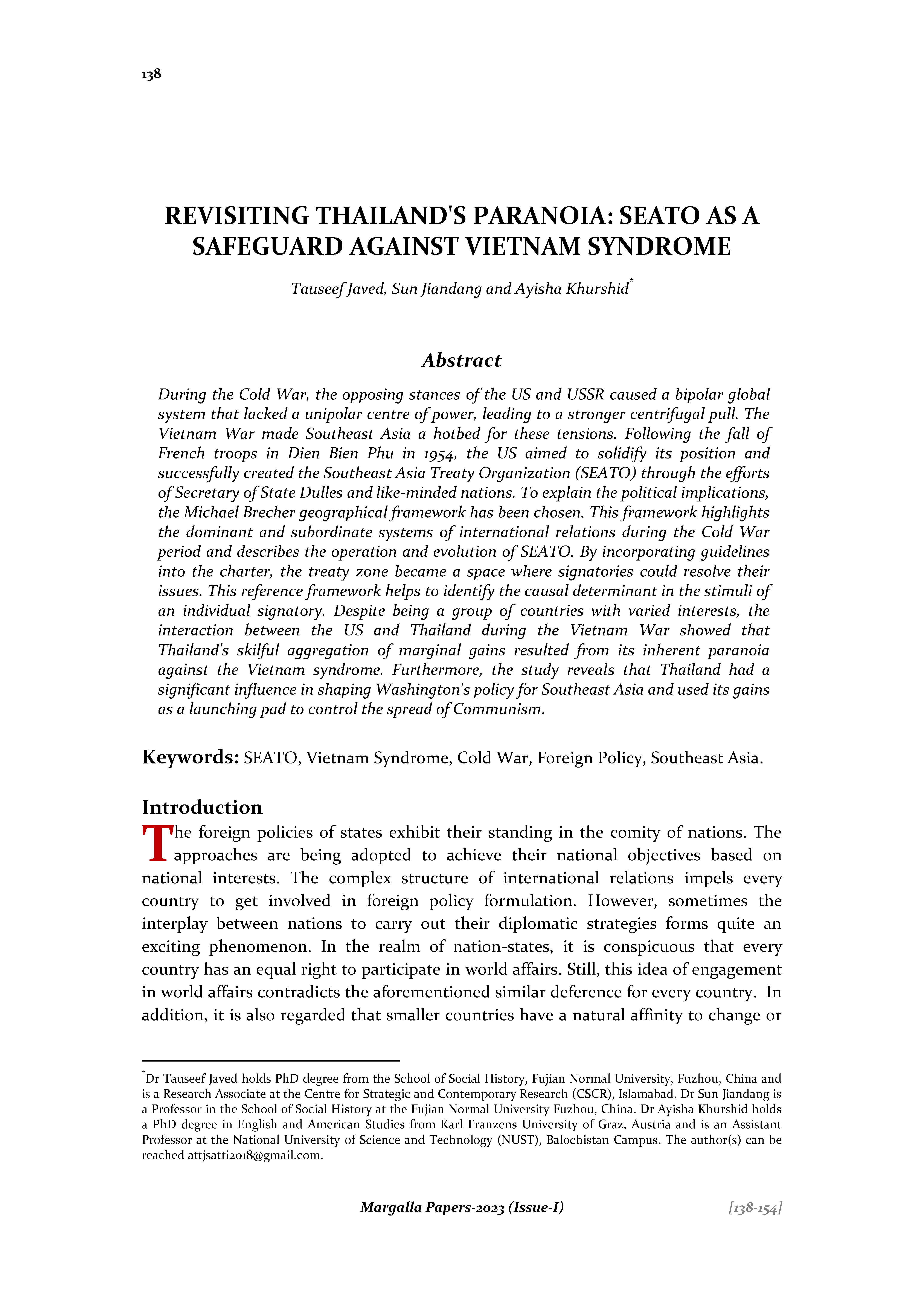REVISITING THAILAND'S PARANOIA: SEATO AS A SAFEGUARD AGAINST VIETNAM SYNDROME
DOI:
https://doi.org/10.54690/margallapapers.27.1.157Keywords:
SEATO, Vietnam Syndrome, Cold War, Foreign Policy, Southeast Asia.Abstract
During the Cold War, the opposing stances of the US and USSR caused a bipolar global system that lacked a unipolar centre of power, leading to a stronger centrifugal pull. The Vietnam War made Southeast Asia a hotbed for these tensions. Following the fall of French troops in Dien Bien Phu in 1954, the US aimed to solidify its position and successfully created the Southeast Asia Treaty Organization (SEATO) through the efforts of Secretary of State Dulles and like-minded nations. To explain the political implications, the Michael Brecher geographical framework has been chosen. This framework highlights the dominant and subordinate systems of international relations during the Cold War period and describes the operation and evolution of SEATO. By incorporating guidelines into the charter, the treaty zone became a space where signatories could resolve their issues. This reference framework helps to identify the causal determinant in the stimuli of an individual signatory. Despite being a group of countries with varied interests, the interaction between the US and Thailand during the Vietnam War showed that Thailand's skilful aggregation of marginal gains resulted from its inherent paranoia against the Vietnam syndrome. Furthermore, the study reveals that Thailand had a significant influence in shaping Washington's policy for Southeast Asia and used its gains as a launching pad to control the spread of Communism.
Bibliography Entry
Javed, Tauseef, Sun Jiandang and Ayisha Khurshid. 2023. "Revisiting Thailand's Paranoia: SEATO As a Safeguard Against Vietnam Syndrome." Margalla Papers 27 (1): 138-154.
References
Byunghoon Ohn. 1966. United States and Southeast Asia, 1945-1954: The Evolution of American Policy in Southeast Asia. University of Kentucky.
Harry S. Truman. 1947. “Address before a Joint Session of Congress.” Washington DC 12.
Byunghoon Ohn. 1966. United States and Southeast Asia, 1945-1954: The Evolution of American Policy in Southeast Asia. University of Kentucky.
“Second Report to Congress on the Mutual Security Program for Six Months Ending,” 25.
“Report to Congress on the Mutual Security Program for the Six Months Ended,” 40.
Thomas Carothers. 2011. Aiding Democracy Abroad: The Learning Curve. Carnegie Endowment. DOI: https://doi.org/10.2307/j.ctt6wpj7p
Julius W. Pratt. 1957. “Documents on American Foreign Relations, 1954. Edited by Peter V. Curl.(New York: Harper and Brothers for the Council on Foreign Relations. 1955. pp. Xxii, 506.

Downloads
Published
How to Cite
Issue
Section
License
Copyright (c) 2023 Tauseef Javed; Sun Jiandang, Ayisha Khurshid

This work is licensed under a Creative Commons Attribution-NonCommercial 4.0 International License.













